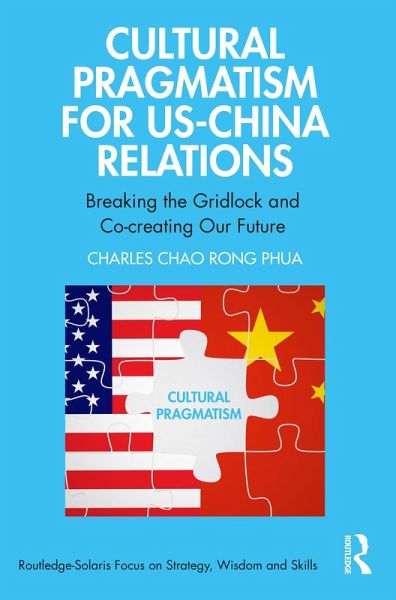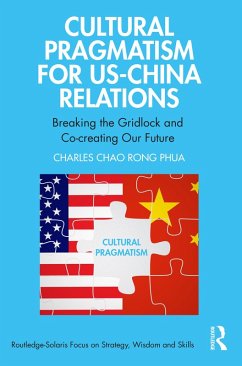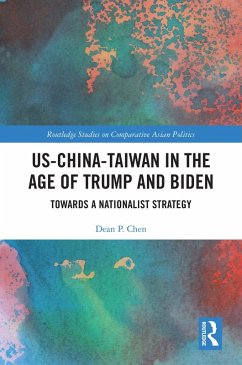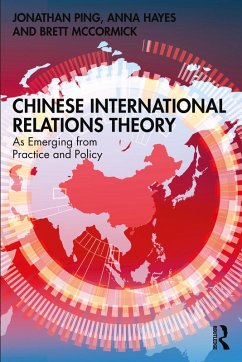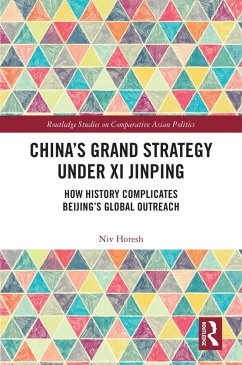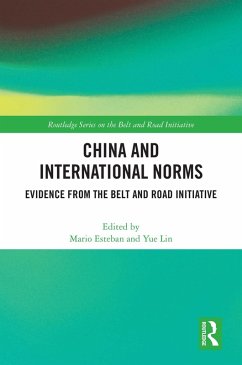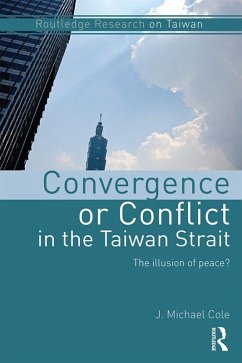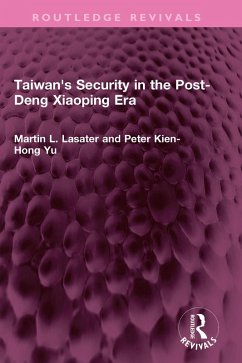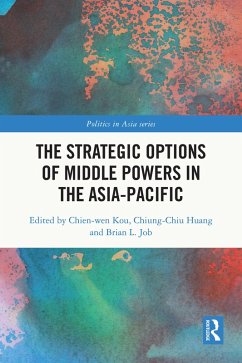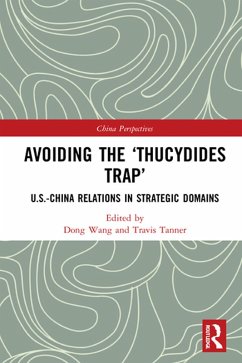Charles Chao Rong Phua
eBook, PDF
Cultural Pragmatism for US-China Relations (eBook, PDF)
Breaking the Gridlock and Co-creating Our Future

PAYBACK Punkte
19 °P sammeln!






The Thucydides trap and a US-China face-off are not structurally inevitable; US-China relations are what the US and China make of them. Phua focuses on the ability to see "US as US" and "China as China" to trigger both countries' cultural tendencies towards pragmatism.Phua examines China's arduous journey to fit in the Westphalian system, the deep cultural misunderstandings by the West of Sunzi's The Art of War, and attempts to offer an inside-out cultural synthesis of classical and modern Chinese thought as a proxy of their operational code, beyond the standard clichés about Confucian and Da...
The Thucydides trap and a US-China face-off are not structurally inevitable; US-China relations are what the US and China make of them. Phua focuses on the ability to see "US as US" and "China as China" to trigger both countries' cultural tendencies towards pragmatism.
Phua examines China's arduous journey to fit in the Westphalian system, the deep cultural misunderstandings by the West of Sunzi's The Art of War, and attempts to offer an inside-out cultural synthesis of classical and modern Chinese thought as a proxy of their operational code, beyond the standard clichés about Confucian and Daoist thought. He builds on Jervis' perception and misperception as well as Alastair Johnston's cultural realism. Readers will benefit from a culturally-Chinese, western-educated and politically neutral understanding of "China as China".
An essential primer for academics, practitioners and students of international relations, diplomacy and Chinese culture.
Phua examines China's arduous journey to fit in the Westphalian system, the deep cultural misunderstandings by the West of Sunzi's The Art of War, and attempts to offer an inside-out cultural synthesis of classical and modern Chinese thought as a proxy of their operational code, beyond the standard clichés about Confucian and Daoist thought. He builds on Jervis' perception and misperception as well as Alastair Johnston's cultural realism. Readers will benefit from a culturally-Chinese, western-educated and politically neutral understanding of "China as China".
An essential primer for academics, practitioners and students of international relations, diplomacy and Chinese culture.
Dieser Download kann aus rechtlichen Gründen nur mit Rechnungsadresse in A, B, BG, CY, CZ, D, DK, EW, E, FIN, F, GR, HR, H, IRL, I, LT, L, LR, M, NL, PL, P, R, S, SLO, SK ausgeliefert werden.
- Geräte: PC
- mit Kopierschutz
- eBook Hilfe
- Text-to-Speech
- E-Mail des Verlags für Barrierefreiheitsfragen: ebookqueries@tandf.co.uk
- Seitennummerierung folgt dem gedruckten Werk
- Kurze Alternativtexte für nicht-textuelle Inhalte vorhanden
- Navigierbarer Index mit direktem Zugriff auf Indexbegriffe
- Navigierbares Inhaltsverzeichnis für direkten Zugriff auf Text und Medien
- Keine Einschränkung der Vorlesefunktionen, außer bei spezifischen Ausnahmen
Charles Chao Rong Phua runs Solaris Strategies Singapore (and chairs Solaris Consortium of Management Consultancies) dedicated to pragmatically solving complex problems involving governments, corporates and underserved non-profits at sector and enterprise levels. This follows two decades in government functioning as head research trainer in defence and chief external affairs supporting cities and infrastructural diplomacy. Charles also presides over the Association for Public Affairs (Singapore) spearheading active citizenry in policymaking and served as chief judge for the Singapore Model Cabinet and Parliament series organised by the government.
He is an internationally certified management consultant, facilitator, project manager, SAFe agile practitioner with a doctorate in public policy, degrees in international relations, security management, education, accounting, organisational psychology, systems thinking and law, and completed executive education in strategy, innovation, entrepreneurship, sustainability and marketing from leading business schools: Harvard, MIT, Stanford, Wharton, Kellogg, Berkeley, Babson, INSEAD, Cambridge, Oxford, London Business School. He currently serves as series editor for Routledge series for strategy, wisdom and skills with a commitment to codify academic + practitioner wisdom in applied and interdisciplinary fields. He is adjunct faculty specialising in applied problem-solving at the National University of Singapore, Nanyang Technological University, Singapore Management University, Singapore University of Social Sciences, University of St Gallen and Civil Service College Singapore. He was a Fulbright fellow with resident fellowships at Brookings Institution, Columbia and Johns Hopkins.
He is an internationally certified management consultant, facilitator, project manager, SAFe agile practitioner with a doctorate in public policy, degrees in international relations, security management, education, accounting, organisational psychology, systems thinking and law, and completed executive education in strategy, innovation, entrepreneurship, sustainability and marketing from leading business schools: Harvard, MIT, Stanford, Wharton, Kellogg, Berkeley, Babson, INSEAD, Cambridge, Oxford, London Business School. He currently serves as series editor for Routledge series for strategy, wisdom and skills with a commitment to codify academic + practitioner wisdom in applied and interdisciplinary fields. He is adjunct faculty specialising in applied problem-solving at the National University of Singapore, Nanyang Technological University, Singapore Management University, Singapore University of Social Sciences, University of St Gallen and Civil Service College Singapore. He was a Fulbright fellow with resident fellowships at Brookings Institution, Columbia and Johns Hopkins.
Produktdetails
- Verlag: Taylor & Francis eBooks
- Seitenzahl: 178
- Erscheinungstermin: 25. Oktober 2022
- Englisch
- ISBN-13: 9781000738575
- Artikelnr.: 65481433
"Better relations between the US and China would be an enormous help in seeking paths through contemporary global challenges. Cultural pragmatism offers helpful suggestions for how these relations might improve, despite their current difficulties."---Professor Craig Calhoun, University Professor of Social Sciences, Arizona State University, former president of London of School of Economics and Social Sciences Research Council (SSRC)
"To see 'China as China', an approach often neglected or ignored, poses a significant intellectual challenge, especially for those confined to a strong tradition of watching China from the perspective of 'Anglo-European
"To see 'China as China', an approach often neglected or ignored, poses a significant intellectual challenge, especially for those confined to a strong tradition of watching China from the perspective of 'Anglo-European
Mehr anzeigen
structuralism'. Dr Phua, feeling at home with both Chinese and Western cultures, wisely observes that pragmatism, drawn from both cultures, is key to easing political tensions between China and the US."---Professor Gerald Chan, Professor of Politics and International Relations, University of Auckland
"Cultural pragmatism as a nuancing, mediating and above all restraining device to avoid the extremes of one form of 'rationality' facing off against another, is the message of Charles Chao Rong Phua's new book. Bold and challenging, above all helpful, the book proposes almost a Buddhist 'middle way' in relations between the US and China."---Professor Stephen Chan OBE, Professor of World Politics and Director of the SOAS Centre for International Studies and Diplomacy, SOAS, University of London
"In this remarkable book, Charles Chao Rong Phua carefully unpacks many significant Chinese perspectives in understanding Sino-US relations. The coverage is both original and comprehensive. This exciting new book provides a timely challenge to the main-stream literature in international relations in general and Sino-US relations, in particular."---Professor Gordon Cheung, Director, Centre for Contemporary Chinese Studies, School of International and Government Affairs, Durham University; Editor-in-Chief, East Asia: An International Quarterly.
"The author of this book offers his readers so much beyond a well-researched analysis of US-China relations and the optimism amidst the possibility that the two countries may be heading for war. Ranging from Chinese political thought, the frequent misreading of Sunzi in the West and the rise of Chinese International Relations Theory, he challenges us to be more optimistic about the relationship between the two powers at a time when optimism is in short supply. In addition, he unpacks theoretical issues with the light touch that will ensure the book a large audience outside the narrow confines of the academic world."---Professor Christopher Coker, Director, LSE IDEAS
"As the world watching China and the US moving towards a highly competitive relationship, Charles Chao Rong Phua provides us an alternative understanding of the two countries' interaction. With his creative intellectual framework of "cultural pragmatism", Phua argues persuasively how are the two countries' strategies shaped by their respective cultures. If both China and the US can exert cultural pragmatism in their relations, we may have a less pessimistic world in the coming decades. Along his unique approach of "seeing China as China", Phua's new book is extremely helpful for all the readers to understand contemporary China's strategic choices."---Professor Da Wei, Director, Centre for International Security and Strategy, and Professor of International Relations, School of Social Sciences, Tsinghua University, and former Director, Institute of American Studies, China Institute of Contemporary International Relations.
"As this study brilliantly conveys, cultural pragmatism offers a vital lens on the US-China relationship that can help the two countries identify sources of mutual misunderstanding to mitigate the risk of unwitting bilateral conflict."---Professor Carla P. Freeman, Senior Expert for China, United States Institute for Peace, and former Executive Director, SAIS Foreign Policy Institute, Johns Hopkins University
"Complementarity in human relations, comparative advantage in trade: Is there a way for the United States and China to settle on something along similar lines, positioning themselves vis-à-vis one another in comparative rather than rivalling ways and seeking their own advantage rather than the other's disadvantage? Charles Phua believes there is a way if the United States specializes in military and China in economic leadership. He argues that, given historical experiences and domestic expectations, as well as cultural legacies rightly understood, this would amount to a form of cultural pragmatism that may work for both sides."---Professor Joerg Friedrichs, Oxford University
"Is Thucydides trap destined? Charles Chao Rong Phua argue that nothing is destined and depends on complex interactions of factors. Specifically, culture matters in perception and misperception. US needs to see 'China as China'. This book written by a western trained, Chinese cultured scholar-practitioner is an attempt to decode China in a politically neutral manner."---Professor Jin Canrong, Professor. Chang Jiang Scholar and Associate Dean, School of International Studies, Renmin University
"In this fascinating work, Charles Phua examines the cultural elements underlying what he calls America and China's strategic pragmatism. Building on his earlier work that explored the pragmatic foreign policy traditions of Singapore, the US, and China, Dr Phua argues for the importance of viewing US-China relations through the lens of "cultural rationalism." His elaboration of the concept allows him to tease out the pragmatic tendencies of the US and China, and how they can facilitate the superpowers' peaceful co-existence in times of geopolitical tension and uncertainty. Scholars and students of international relations will find this book an engaging and provocative read."---Professor Khong Yuen Foong, Lee Ka Shing Professor of Political Science, National University of Singapore
"Pragmatism has great potential in the theory and practice of international relations. Charles Phua previously contributed to the scaffolding of Strategic Pragmatism in foreign policy. In this sequel, Charles Phua extends his pragmatism thesis further to include cultural perceptions and misperceptions with a hope that both the US and China can rekindle their innate pragmatic tendencies and creatively find win-win solutions for mutual interdependence and a path towards cooperation rather than conflict."---Professor Sarah Kreps, John L. Wetherill Professor in the Department of Government, Director, Cornell Tech Policy Lab, Cornell University, and non-resident senior fellow, Brookings Institution.
"China has been rising really fast in the past few decades, perhaps too fast for many political leaders and analysts in the rest of the world to have time to update their knowledge about this rising power. As a result, misperceptions and misunderstandings may have played an unfortunate role in shaping many countries' reactions to China's intentions and policies. Dr. Phua's new book is a great work that helps us understand China as China, particularly China's pragmatism from its own cultural perspectives. More accurate understanding of Chinese pragmatism will be tremendously useful for the purpose of managing Sino-US differences and conflicts and maintaining peace and security in the Asia Pacific."---Professor Li Mingjiang, Provost's Chair in International Relations at the S. Rajaratnam School of International Studies, Nanyang Technological University
"The ongoing strategic, economic, technological, and diplomatic competition between the United States and China has become the definitive issue of our time. As this great power rivalry deepens, the search for ways to manage bilateral tensions and identify green shoots of cooperation has become more urgent. Using the concept of cultural pragmatism, Charles Phua mines deep into the ideational reservoirs of American and Chinese society to unearth historical elements of cultural dynamism that, he argues, should lend to much-needed policy pragmatism even as decision-makers in Washington and Beijing calibrate their approach to each other. This novel way of thinking about Sino-US relations should be of interest to all who are concerned about the future of this relationship."---Professor Joseph Chinyong Liow, Tan Kah Kee Chair of Comparative and International Politics and Dean of Humanities, Arts and Social Sciences, Nanyang Technological University
"The US and China appear to be in loggerheads, but this needs not be the outcome. Sun Tzu is famous for 'winning without fighting'. The world may have read about Sun Tzu but never really understood Sun Tzu. Charles Chao Rong Phua's book showcases a deep understanding of Sun Tzu, where the purpose of military force is meant to stop fighting and the best strategic positioning is to design mutual security without destroying the enemy. The question is whether scholars and policymakers can appreciate Sun Tzu as he is and transplant lessons to modern day problems. A deep cultural understanding of both the US and China is critical for world peace."---Professor Hwy-Chang Moon, Professor Emeritus, Graduate School of International Studies, Seoul National University, and author of The Art of Strategy: Sun Tzu, Michael Porter and Beyond
"Following up his previous work on strategic pragmatism in foreign policy, Charles Phua goes a step further by seeking to demonstrate how two different political systems with two different goals -- the US and China -- can coexist peacefully if they can negotiate a two-track world leadership model focusing on economic and military dominance in which each side accepts the primacy of the other in one of these realms. In the course of setting out his provocative argument, Phua offers valuable insights on such topics as the origins of Chinese philosophy, the contrast between Anglo-American and Chinese international relations theory, and the (mis)use of Sunzi in US military thinking."---Professor Stanley Rosen, Professor of Political Science and International Relations, Dornsife College of Letters, Arts and Sciences, University of Southern California
"Despite Chinese and American tendency to ascribe non-rational impulses to the other's policy making, Charles Chao Rong Phua shows that pragmatism is a cultural trait of both Chinese and American approaches to politics. Through a close examination of the literature on the Chinese classics and of contemporary American and Chinese theoretical treatments of international politics, Phua shows that common cultural traits allow mutual pragmatic accommodation and a stable and cooperative U.S.-China relationship."---Professor Robert S. Ross, Professor of Political Science at Boston College and Associate, John King Fairbank Center for Chinese Studies, Harvard University
"In terms of foreign policy, many are often confused by China's stress of holding principle in contrast of its real performance. This phenomenon actually also happens for America for its foreign policy making and deviation. Charles has offered a unique tool of cultural penetration to decipher the source of their actual pragmatism. His unique analysis contributes greatly to understanding China, the US, as well as their mutual perception and strategic interaction. A top-rate must-read for professionals as well as general public when the world is so rich in distrust and even conflict."---Professor Shen Dingli, Deputy Dean of Institute of International Studies, and Director, Centre for American Studies, Fudan University
"Cultural pragmatism is a valuable and important concept created with elaboration by Dr. Charles Chao Rong Phua, a scholar having multiple cultural backgrounds. Cultural pragmatism rejects self-righteousness, exclusiveness, extra-moralism and ideological bias, all in terms of the strongly felt cultural superiority. One could have no confidence as Dr. Phua might have in the probability of perhaps the mainstream opinions in both the United States and China to apply it to the U.S.-China relations in their so severe deterioration, but still both should learn something from this distinguished book, first of all because this deterioration has been driven partly by each other's feeling or even belief in the cultural superiority of its own."---Professor Shi Yinhong, Distinguished Professor of International Relations, Renmin University of China
"China and the United States are, respectively, the typical representatives of the oriental and western cultures. But there is an interesting phenomenon, when Americans and Chinese meet in person, they will find it very easy to get along with each other. Dr. Charles Chao Rong Phua's research finds that the reason lies in the fact that both peoples have "innate pragmatist tendencies". His book constructs a meaningful theoretical analysis framework of "cultural pragmatism", which shows that China and the United States can get out of the gridlock of confrontation. As both China and the United States are civilization-states, we should pay attention to the cultural homogeneity of the two sides, and should not put too much emphasis on ideological political differences. This will promote mutual respect and friendly relations between the two countries."---Professor Su Hao, Professor in the Department of Diplomacy, and Founding Director, Center for Strategic and Peace Studies, Chinese Foreign Affairs University
"As China and the United States increasingly confront one another in Asia and the world, they need to consider the importance in the region of the more optimistic outlook based on Dr. Phua's broad-ranging argument."---Professor Robert Sutter, Professor of Practice of International Affairs, George Washington University
"At a time when deteriorating US-China relations poses a potentially grave threat to world prosperity and stability, Charles Chao Rong Phua's book offers a lucid and optimistic plea for each side to better understand the international relations traditions of the other."---Professor Michael Szonyi, Frank Wen-hsiung Wu Professor of Chinese History and Director of the Fairbank Center for Chinese Studies, Harvard University
"US and China are great powers. With great power, comes great responsibility. Can both be partners to share responsibility for the betterment of the world? Charles Phua argued that both countries have pragmatic tendencies (strategic pragmatism) and if they add deeper cultural understanding of one another (cultural pragmatism), then they can work towards a win-win future of common prosperity and stability."---Professor Wang Zhengyi, Distinguished Professor and Chang Jiang Scholar, School of International Studies, Peking University
"US-China scholars often believe both US and China are pragmatic. Dr Charles Chao Rong Phua examined this perspective with interesting insights. The most memorable insight is that US's pragmatism leans towards security interest while Chinese pragmatism leans towards economic interest. A clear identification and acknowledgement of differing yet possibly complementary interests by both US and China is pivotal towards exploring win-win solutions.
In an age of multi-civilisational cooperation-competition (co-optition), contact between Judeo-Christian civilisation represented by America and Chinese civilisation may become a clash of civilisations. Hence, in order to promote positive collaborations, both sides need to deeply understand each other, and the US and West needs to understand 'China as China'. This is where Charles Phua's Cultural Pragmatism in US-China Relations offers a paradigm shifting perspective."
---Professor Xue Li, Director, Institute of World Economics and Politics, Chinese Academy of Social Sciences, and Professor and Doctoral Supervisor of International Relations, University of Chinese Academy of Social Sciences
'As a researcher on Chinese decision-making, I am struck by how cognitive biases have affected Chinese decision-making and public policies. The biases have produced both negative as well as positive consequences depending on contexts. Dr. Phua's new book helps us to better understand the cultural dimension of such biases.'---Professor Dali L. Yang, Willaim Claude Reavis Professor of Political Science, University of Chicago
"China and the United States are two great powers in international affairs. Must US-China be competing destructively? Western history and culture appear so. Charles Phua's research offered a different perspective from Chinese strategic pragmatism. In Cultural Pragmatism, Phua opines that Chinese culture leans towards mutual economic prosperity rather than security dominance. There is common space to allow both countries to compete constructively in economics and uplift development of many countries, yet also develop a shared global security architecture. The latter is easier when the 'enemy' is not one another but rather the 'other' like terrorism, climate change and common threats to humanity."---Professor Ye Zicheng, Founding Director, China Center for Strategic Studies, Peking University
"With a unique insight into the origins of Chinese political thought, Charles Chao Rong Phua offers a provocative diagnosis of misperceptions between the US and China and presents cultural pragmatism as an enlightened prescription to cross the chasm between the two great powers. A must read for all who care about this hugely important topic."---Professor Zhang Weiwei, Dean, China Institute, Fudan University
"Cultural pragmatism as a nuancing, mediating and above all restraining device to avoid the extremes of one form of 'rationality' facing off against another, is the message of Charles Chao Rong Phua's new book. Bold and challenging, above all helpful, the book proposes almost a Buddhist 'middle way' in relations between the US and China."---Professor Stephen Chan OBE, Professor of World Politics and Director of the SOAS Centre for International Studies and Diplomacy, SOAS, University of London
"In this remarkable book, Charles Chao Rong Phua carefully unpacks many significant Chinese perspectives in understanding Sino-US relations. The coverage is both original and comprehensive. This exciting new book provides a timely challenge to the main-stream literature in international relations in general and Sino-US relations, in particular."---Professor Gordon Cheung, Director, Centre for Contemporary Chinese Studies, School of International and Government Affairs, Durham University; Editor-in-Chief, East Asia: An International Quarterly.
"The author of this book offers his readers so much beyond a well-researched analysis of US-China relations and the optimism amidst the possibility that the two countries may be heading for war. Ranging from Chinese political thought, the frequent misreading of Sunzi in the West and the rise of Chinese International Relations Theory, he challenges us to be more optimistic about the relationship between the two powers at a time when optimism is in short supply. In addition, he unpacks theoretical issues with the light touch that will ensure the book a large audience outside the narrow confines of the academic world."---Professor Christopher Coker, Director, LSE IDEAS
"As the world watching China and the US moving towards a highly competitive relationship, Charles Chao Rong Phua provides us an alternative understanding of the two countries' interaction. With his creative intellectual framework of "cultural pragmatism", Phua argues persuasively how are the two countries' strategies shaped by their respective cultures. If both China and the US can exert cultural pragmatism in their relations, we may have a less pessimistic world in the coming decades. Along his unique approach of "seeing China as China", Phua's new book is extremely helpful for all the readers to understand contemporary China's strategic choices."---Professor Da Wei, Director, Centre for International Security and Strategy, and Professor of International Relations, School of Social Sciences, Tsinghua University, and former Director, Institute of American Studies, China Institute of Contemporary International Relations.
"As this study brilliantly conveys, cultural pragmatism offers a vital lens on the US-China relationship that can help the two countries identify sources of mutual misunderstanding to mitigate the risk of unwitting bilateral conflict."---Professor Carla P. Freeman, Senior Expert for China, United States Institute for Peace, and former Executive Director, SAIS Foreign Policy Institute, Johns Hopkins University
"Complementarity in human relations, comparative advantage in trade: Is there a way for the United States and China to settle on something along similar lines, positioning themselves vis-à-vis one another in comparative rather than rivalling ways and seeking their own advantage rather than the other's disadvantage? Charles Phua believes there is a way if the United States specializes in military and China in economic leadership. He argues that, given historical experiences and domestic expectations, as well as cultural legacies rightly understood, this would amount to a form of cultural pragmatism that may work for both sides."---Professor Joerg Friedrichs, Oxford University
"Is Thucydides trap destined? Charles Chao Rong Phua argue that nothing is destined and depends on complex interactions of factors. Specifically, culture matters in perception and misperception. US needs to see 'China as China'. This book written by a western trained, Chinese cultured scholar-practitioner is an attempt to decode China in a politically neutral manner."---Professor Jin Canrong, Professor. Chang Jiang Scholar and Associate Dean, School of International Studies, Renmin University
"In this fascinating work, Charles Phua examines the cultural elements underlying what he calls America and China's strategic pragmatism. Building on his earlier work that explored the pragmatic foreign policy traditions of Singapore, the US, and China, Dr Phua argues for the importance of viewing US-China relations through the lens of "cultural rationalism." His elaboration of the concept allows him to tease out the pragmatic tendencies of the US and China, and how they can facilitate the superpowers' peaceful co-existence in times of geopolitical tension and uncertainty. Scholars and students of international relations will find this book an engaging and provocative read."---Professor Khong Yuen Foong, Lee Ka Shing Professor of Political Science, National University of Singapore
"Pragmatism has great potential in the theory and practice of international relations. Charles Phua previously contributed to the scaffolding of Strategic Pragmatism in foreign policy. In this sequel, Charles Phua extends his pragmatism thesis further to include cultural perceptions and misperceptions with a hope that both the US and China can rekindle their innate pragmatic tendencies and creatively find win-win solutions for mutual interdependence and a path towards cooperation rather than conflict."---Professor Sarah Kreps, John L. Wetherill Professor in the Department of Government, Director, Cornell Tech Policy Lab, Cornell University, and non-resident senior fellow, Brookings Institution.
"China has been rising really fast in the past few decades, perhaps too fast for many political leaders and analysts in the rest of the world to have time to update their knowledge about this rising power. As a result, misperceptions and misunderstandings may have played an unfortunate role in shaping many countries' reactions to China's intentions and policies. Dr. Phua's new book is a great work that helps us understand China as China, particularly China's pragmatism from its own cultural perspectives. More accurate understanding of Chinese pragmatism will be tremendously useful for the purpose of managing Sino-US differences and conflicts and maintaining peace and security in the Asia Pacific."---Professor Li Mingjiang, Provost's Chair in International Relations at the S. Rajaratnam School of International Studies, Nanyang Technological University
"The ongoing strategic, economic, technological, and diplomatic competition between the United States and China has become the definitive issue of our time. As this great power rivalry deepens, the search for ways to manage bilateral tensions and identify green shoots of cooperation has become more urgent. Using the concept of cultural pragmatism, Charles Phua mines deep into the ideational reservoirs of American and Chinese society to unearth historical elements of cultural dynamism that, he argues, should lend to much-needed policy pragmatism even as decision-makers in Washington and Beijing calibrate their approach to each other. This novel way of thinking about Sino-US relations should be of interest to all who are concerned about the future of this relationship."---Professor Joseph Chinyong Liow, Tan Kah Kee Chair of Comparative and International Politics and Dean of Humanities, Arts and Social Sciences, Nanyang Technological University
"The US and China appear to be in loggerheads, but this needs not be the outcome. Sun Tzu is famous for 'winning without fighting'. The world may have read about Sun Tzu but never really understood Sun Tzu. Charles Chao Rong Phua's book showcases a deep understanding of Sun Tzu, where the purpose of military force is meant to stop fighting and the best strategic positioning is to design mutual security without destroying the enemy. The question is whether scholars and policymakers can appreciate Sun Tzu as he is and transplant lessons to modern day problems. A deep cultural understanding of both the US and China is critical for world peace."---Professor Hwy-Chang Moon, Professor Emeritus, Graduate School of International Studies, Seoul National University, and author of The Art of Strategy: Sun Tzu, Michael Porter and Beyond
"Following up his previous work on strategic pragmatism in foreign policy, Charles Phua goes a step further by seeking to demonstrate how two different political systems with two different goals -- the US and China -- can coexist peacefully if they can negotiate a two-track world leadership model focusing on economic and military dominance in which each side accepts the primacy of the other in one of these realms. In the course of setting out his provocative argument, Phua offers valuable insights on such topics as the origins of Chinese philosophy, the contrast between Anglo-American and Chinese international relations theory, and the (mis)use of Sunzi in US military thinking."---Professor Stanley Rosen, Professor of Political Science and International Relations, Dornsife College of Letters, Arts and Sciences, University of Southern California
"Despite Chinese and American tendency to ascribe non-rational impulses to the other's policy making, Charles Chao Rong Phua shows that pragmatism is a cultural trait of both Chinese and American approaches to politics. Through a close examination of the literature on the Chinese classics and of contemporary American and Chinese theoretical treatments of international politics, Phua shows that common cultural traits allow mutual pragmatic accommodation and a stable and cooperative U.S.-China relationship."---Professor Robert S. Ross, Professor of Political Science at Boston College and Associate, John King Fairbank Center for Chinese Studies, Harvard University
"In terms of foreign policy, many are often confused by China's stress of holding principle in contrast of its real performance. This phenomenon actually also happens for America for its foreign policy making and deviation. Charles has offered a unique tool of cultural penetration to decipher the source of their actual pragmatism. His unique analysis contributes greatly to understanding China, the US, as well as their mutual perception and strategic interaction. A top-rate must-read for professionals as well as general public when the world is so rich in distrust and even conflict."---Professor Shen Dingli, Deputy Dean of Institute of International Studies, and Director, Centre for American Studies, Fudan University
"Cultural pragmatism is a valuable and important concept created with elaboration by Dr. Charles Chao Rong Phua, a scholar having multiple cultural backgrounds. Cultural pragmatism rejects self-righteousness, exclusiveness, extra-moralism and ideological bias, all in terms of the strongly felt cultural superiority. One could have no confidence as Dr. Phua might have in the probability of perhaps the mainstream opinions in both the United States and China to apply it to the U.S.-China relations in their so severe deterioration, but still both should learn something from this distinguished book, first of all because this deterioration has been driven partly by each other's feeling or even belief in the cultural superiority of its own."---Professor Shi Yinhong, Distinguished Professor of International Relations, Renmin University of China
"China and the United States are, respectively, the typical representatives of the oriental and western cultures. But there is an interesting phenomenon, when Americans and Chinese meet in person, they will find it very easy to get along with each other. Dr. Charles Chao Rong Phua's research finds that the reason lies in the fact that both peoples have "innate pragmatist tendencies". His book constructs a meaningful theoretical analysis framework of "cultural pragmatism", which shows that China and the United States can get out of the gridlock of confrontation. As both China and the United States are civilization-states, we should pay attention to the cultural homogeneity of the two sides, and should not put too much emphasis on ideological political differences. This will promote mutual respect and friendly relations between the two countries."---Professor Su Hao, Professor in the Department of Diplomacy, and Founding Director, Center for Strategic and Peace Studies, Chinese Foreign Affairs University
"As China and the United States increasingly confront one another in Asia and the world, they need to consider the importance in the region of the more optimistic outlook based on Dr. Phua's broad-ranging argument."---Professor Robert Sutter, Professor of Practice of International Affairs, George Washington University
"At a time when deteriorating US-China relations poses a potentially grave threat to world prosperity and stability, Charles Chao Rong Phua's book offers a lucid and optimistic plea for each side to better understand the international relations traditions of the other."---Professor Michael Szonyi, Frank Wen-hsiung Wu Professor of Chinese History and Director of the Fairbank Center for Chinese Studies, Harvard University
"US and China are great powers. With great power, comes great responsibility. Can both be partners to share responsibility for the betterment of the world? Charles Phua argued that both countries have pragmatic tendencies (strategic pragmatism) and if they add deeper cultural understanding of one another (cultural pragmatism), then they can work towards a win-win future of common prosperity and stability."---Professor Wang Zhengyi, Distinguished Professor and Chang Jiang Scholar, School of International Studies, Peking University
"US-China scholars often believe both US and China are pragmatic. Dr Charles Chao Rong Phua examined this perspective with interesting insights. The most memorable insight is that US's pragmatism leans towards security interest while Chinese pragmatism leans towards economic interest. A clear identification and acknowledgement of differing yet possibly complementary interests by both US and China is pivotal towards exploring win-win solutions.
In an age of multi-civilisational cooperation-competition (co-optition), contact between Judeo-Christian civilisation represented by America and Chinese civilisation may become a clash of civilisations. Hence, in order to promote positive collaborations, both sides need to deeply understand each other, and the US and West needs to understand 'China as China'. This is where Charles Phua's Cultural Pragmatism in US-China Relations offers a paradigm shifting perspective."
---Professor Xue Li, Director, Institute of World Economics and Politics, Chinese Academy of Social Sciences, and Professor and Doctoral Supervisor of International Relations, University of Chinese Academy of Social Sciences
'As a researcher on Chinese decision-making, I am struck by how cognitive biases have affected Chinese decision-making and public policies. The biases have produced both negative as well as positive consequences depending on contexts. Dr. Phua's new book helps us to better understand the cultural dimension of such biases.'---Professor Dali L. Yang, Willaim Claude Reavis Professor of Political Science, University of Chicago
"China and the United States are two great powers in international affairs. Must US-China be competing destructively? Western history and culture appear so. Charles Phua's research offered a different perspective from Chinese strategic pragmatism. In Cultural Pragmatism, Phua opines that Chinese culture leans towards mutual economic prosperity rather than security dominance. There is common space to allow both countries to compete constructively in economics and uplift development of many countries, yet also develop a shared global security architecture. The latter is easier when the 'enemy' is not one another but rather the 'other' like terrorism, climate change and common threats to humanity."---Professor Ye Zicheng, Founding Director, China Center for Strategic Studies, Peking University
"With a unique insight into the origins of Chinese political thought, Charles Chao Rong Phua offers a provocative diagnosis of misperceptions between the US and China and presents cultural pragmatism as an enlightened prescription to cross the chasm between the two great powers. A must read for all who care about this hugely important topic."---Professor Zhang Weiwei, Dean, China Institute, Fudan University
Schließen
Für dieses Produkt wurde noch keine Bewertung abgegeben. Wir würden uns sehr freuen, wenn du die erste Bewertung schreibst!
Eine Bewertung schreiben
Eine Bewertung schreiben
Andere Kunden interessierten sich für



